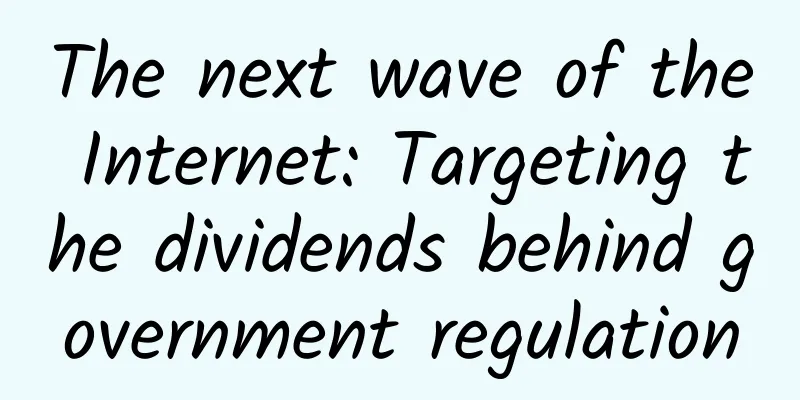The next wave of the Internet: Targeting the dividends behind government regulation

|
A powerful and ambitious Internet imperialism is constantly expanding its borders. The Internet has evolved from an information industry to the basic structure of the entire world. The Internet has triggered the third industrial revolution, which has just begun. Someone has counted that 17 traditional industries will be subverted by the Internet, including retail, wholesale, manufacturing, advertising, journalism, communications, logistics, hotel and tourism, catering, finance, insurance, medical, education, TV program, film, publishing, and monopoly industries. Unlike the US market economy, China's market economy is not a completely free market, but a "socialist market economy", where the "visible" hand of the government and the "invisible" hand of the market work together. China's industries include those that are completely open to private and foreign capital, those that are semi-open and semi-regulated, and those that are almost entirely controlled by foreign capital. The power of the Internet has gradually entered the regulatory field of the deep waters of reform from the field of a complete market economy, chasing "regulatory dividends" or "non-reform dividends" and forcing reform. From the perspective of a fully market economy, the Internet has already changed the retail and advertising industries like a whirlwind. In these areas where market competition is sufficient, there is already fierce competition, with a large number of private and foreign companies. For example, in the supermarket retail industry, there are China Resources, Wumart, and Walmart and Carrefour abroad, and in the home appliance chain, there are Suning, Gome, etc. After the rise of Internet e-commerce, these retail industries have faced problems that are much more troublesome than the economic cycle. Their sales have begun to disappear, and people's shopping habits have changed fundamentally. Alibaba, which just went public in the United States, has created a miracle in the capital market. This miracle comes from squeezing the traditional retail industry. Alibaba has even created a shopping festival that is independent of the Christmas and New Year seasons, the Double Eleven Carnival. Newspaper, magazine and TV advertising, outdoor advertising, etc. have been cut by search engine companies such as Google and Baidu. Last year, there was a signal that Baidu's advertising revenue had exceeded that of China's largest TV station, CCTV. On one side are search engine companies with rising net profits every year, and on the other side is the shaky traditional advertising industry. After taking over the field of fully market economy, the semi-regulated market economy is also being devoured by the Internet. Typical examples are the telecommunications and media industries. Although Internet companies that did not have a good business model relied on the SP business of telecommunications companies to survive during the Internet bubble at the beginning of the new century, ten years later, these little penguins that relied on others have turned over and become masters. Mobile communication tools such as WeChat have dealt a devastating blow to the SMS and call businesses of telecommunications companies. The market value of Tencent is almost equal to that of China Mobile. The semi-regulated media industry has two forms: party newspapers and metropolitan newspapers. Even though traditional media have developed websites, their channel advantages no longer exist. They were first controlled by the four major portals, and are now gradually being handed over to WeChat public accounts and Toutiao. Even the content advantages that traditional media have always boasted of are slowly being lost. The content provided by the rising self-media people and UGC is no worse than that provided by the all-purpose media. In areas where the government controls most of the market, the impact of the Internet has arrived. Currently, the hottest entrepreneurial directions are Internet finance, Internet education and Internet healthcare, all of which are industries that are firmly controlled by the government. The vast majority of China's commercial banks, insurance companies and other financial institutions have government shareholders, the vast majority of small and medium-sized enterprises, including colleges and universities, are government-run, and almost all hospitals are public institutions that rely on drugs to support medical care. The emergence of Yu'ebao in 2013 and the rise of P2P online lending actually announced the early arrival of interest rate liberalization; the competition between YY Education and New Oriental is actually a fight for the initiative of future Internet education; Ant Financial's "future hospital" and WeChat Pay's "smart life", Chunyu Doctor and Dingxiangyuan received huge investments, all of which are transforming the medical process and the future of mobile medical care. These three industries are all tens of trillions of markets. Although they are difficult to crack, every step forward will start to make gold fall from the sky. On the one hand, the natural development of the Internet has reached the point where it can overflow. Whether it is technology, capital or thinking, they have all developed to a mature stage. Last year, Internet thinking swept across Chinese society and became a buzzword. This is an example. On the other hand, the Chinese government is trying to promote and deepen reforms in the economic field, gradually liberalizing market regulation and approval. For example, this year, private bank licenses have been opened. When the government relaxed regulations, the traditional forces in the industry had not had time to enter, and the Internet forces took the lead at lightning speed, opening up one industry and occupying another. In addition, the Internet has bypassed many regulatory barriers through technical means, resulting in many regulations existing in name only. This forced mechanism has also prompted the government to open up more areas. For example, taxi-hailing apps have already impacted the city's taxi license management system. The rent-seeking and taxi-hailing difficulties caused by the taxi license franchise system have plagued the system for many years, but the system has been very stable. Under the impact of the Internet's powerful capital and mobile Internet technology, the system has seen its end. The government reformers are also happy to see this happen. The forced push from the Internet from the private sector has increased the voice of reform. If there were no impact from Yu'ebao and various types of Baobao, interest rate marketization might not be able to reach an agreement so quickly among all parties. Regulatory economics can be found in corresponding fields in both Western Europe and China. French economist Jean Tirole won this year's Nobel Prize in Economics, proving that the regulatory field will be a future direction of economics. The new Chinese government no longer adopts the old method of loosening monetary policy and increasing infrastructure investment. Instead, it promotes economic development by increasing reform efforts, reducing government approvals, opening up the state-owned assets sector, and exploring mixed ownership. The direction is to reduce regulations and demand benefits from reform. The Internet has become an important part of China's economy and one of the most sensitive and enterprising industries. Internet companies are the first to know when the economic direction is changing. The areas where the government is regulating and gradually relaxing regulations are the spring of investment and entrepreneurship in the Internet industry. As a winner of Toutiao's Qingyun Plan and Baijiahao's Bai+ Plan, the 2019 Baidu Digital Author of the Year, the Baijiahao's Most Popular Author in the Technology Field, the 2019 Sogou Technology and Culture Author, and the 2021 Baijiahao Quarterly Influential Creator, he has won many awards, including the 2013 Sohu Best Industry Media Person, the 2015 China New Media Entrepreneurship Competition Beijing Third Place, the 2015 Guangmang Experience Award, the 2015 China New Media Entrepreneurship Competition Finals Third Place, and the 2018 Baidu Dynamic Annual Powerful Celebrity. |
>>: Renren sells off 56.com: after the bloat, only depression remains
Recommend
Natural history on the tip of your tongue, taste the culture and knowledge about food
Experience the culture and knowledge about food, u...
How much do you know about Facebook operation skills?
Everyone knows how to use Facebook to attract tra...
Academician Zhang Boli has maintained this habit for 20 years: walking 7,000 steps a day is best!
Reviewer of this article: Chen Haixu, Deputy Dire...
Exaggerated! World famous paintings have been hanging upside down for 75 years? What do scientists say about aesthetics?
Recently, the art world has made a ridiculous &qu...
How to check the popularity of keywords in Baidu promotion? Is there any tool?
The keyword tool is a powerful assistant that hel...
Food is the first necessity of the people. Learn about rice aerospace breeding
As the saying goes, "food is the first neces...
Tiankun, the country’s magic weapon, is built by Chinese youth!
A national treasure The sharp auger "gnaws&q...
12 Industry Trends of “Internet+”
At this year's two sessions, Premier Li Keqia...
How to leverage marketing?
The balance between the brand recognition through...
Are you anxious about the college entrance examination? Let's hear what the experts say
It's June again, and as the college entrance ...
Having trouble promoting Fanstong? Here are practical optimization cases to help you!
Today I would like to share with you some optimiz...
A dose of science | Is that you? Research finds that people with stronger immunity have higher "appearance"
"Wow, your immunity is so strong... The moon...
Marketing Planning Triangle Law!
Predicting the launch of new products is like for...
The secret weapon of operational optimization: Re-understand the power of heat maps! (superior)
In this two-part article, I’ll describe how heatm...
Social event planning and promotion tips!
There are two main types of community activities....









